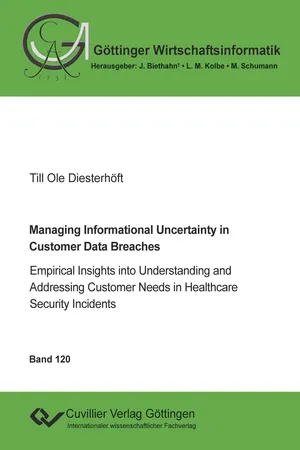
- 224 pages
- English
- PDF
- Available on iOS & Android
About this book
Recent research indicates that customers experience informational uncertainty following a data breach, a phenomenon that can result in adverse outcomes for companies, including diminished intentions to continue the business relationship. Informational uncertainty arises when customers lack clear information about the cause, scope, and personal consequences of a data breach. This dissertation sheds light on this emerging phenomenon and explores how to manage informational uncertainty from a risk management perspective, supported by one literature review and three empirical studies. The findings emphasize that informational uncertainty takes root before a customer data breach, offering companies an opportunity to prospectively influence customer perceptions. Furthermore, the research finds that customers experience reduced uncertainty when they perceive a degree of control over the data breach response process. The dissertation also explores the potential of collecting insights from affected customers, suggesting that such feedback can inform retrospective adjustments to manage informational uncertainty. These findings not only advance the understanding of customer data breach management but also highlight the nuanced interplay of informational uncertainty throughout different phases of a data breach.Aktuelle Forschungen deuten darauf hin, dass Kunden nach einem Datenleck von informationeller Unsicherheit betroffen sind – ein Phänomen, das für Unternehmen nachteilige Folgen haben kann, einschließlich einer verringerten Absicht, die Geschäftsbeziehung fortzusetzen. Informationelle Unsicherheit entsteht, wenn Kunden klare Informationen über die Ursache, den Umfang und die persönlichen Konsequenzen eines Datenlecks fehlen. Diese Dissertation beleuchtet dieses Phänomen und erforscht, wie informationelle Unsicherheit aus der Perspektive des Risikomanagements adressiert werden kann, gestützt auf ein Literaturreview und drei empirische Studien.Die Ergebnisse zeigen, dass sich informationelle Unsicherheit bereits im Vorfeld eines Datenlecks bei den Kunden zu verankern beginnt, was Unternehmen die Möglichkeit bietet, die Wahrnehmung der Kunden vorausschauend zu beeinflussen. Zudem wird aufgezeigt, dass Kunden eine verringerte Unsicherheit erleben, wenn sie ein Maß an Kontrolle über den Prozess nach einem Datenleck wahrnehmen. Die Dissertation zeigt auch, dass Kundenfeedback genutzt werden kann, um die informationelle Unsicherheit bei zukünftigen Datenlecks zu reduzieren. Diese Ergebnisse tragen nicht nur zum Verständnis des Managements von Datenlecks bei, sondern beleuchten auch das Zusammenspiel der informationellen Unsicherheit in dessen verschiedenen Phasen.
Frequently asked questions
- Essential is ideal for learners and professionals who enjoy exploring a wide range of subjects. Access the Essential Library with 800,000+ trusted titles and best-sellers across business, personal growth, and the humanities. Includes unlimited reading time and Standard Read Aloud voice.
- Complete: Perfect for advanced learners and researchers needing full, unrestricted access. Unlock 1.4M+ books across hundreds of subjects, including academic and specialized titles. The Complete Plan also includes advanced features like Premium Read Aloud and Research Assistant.
Please note we cannot support devices running on iOS 13 and Android 7 or earlier. Learn more about using the app.
Information
Table of contents
- Acknowledgements
- Abstract
- Table of Contents
- List of Figures
- List of Tables
- List of Abbreviations
- A. Foundations
- I. Introduction
- I.1 Motivation
- I.2 Research Gaps and Research Questions
- I.3 Dissertation Structure
- I.4 Research Positioning
- I.5 Anticipated Contributions and Implications
- II. Research Background
- II.1 The Emergence of Customer Data Breaches
- II.2 Responding to Customer Data Breaches
- II.3 Taking a Customer Perspective: The Risk of Informational Uncertainty in Customer Data Breaches
- II.4 Toward Managing Informational Uncertainty in Customer Data Breaches
- B. Studies on Informational Uncertainty in Customer Data Breaches
- I. Knowledge Base for Managing Customer Data Breaches
- 1. Study 1: Paving the Way for Co-Creation in Data Breach Responses
- 1.1 Introduction
- 1.2 Conceptual Background
- 1.3 Hermeneutic Literature Review
- 1.4 Results: Key Concepts of Service Failure Co-Recovery
- 1.5 Conceptualization of Co-Creation in Data Breach Responses
- 1.6 Concluding Remarks
- II. Strategic Approaches to Manage Informational Uncertainty
- 1. Study 2: Investigating Blame-Shifting in Customer Data Breaches
- 1.1 Introduction
- 1.2 Research and Theoretical Background
- 1.3 A Contextual Understanding of Customer Attributions in a Data Breach
- 1.4 Hypotheses Development and Research Model
- 1.5 Research Design
- 1.6 Results
- 1.7 Discussion
- 1.8 Conclusion
- 1.9 Appendix
- 2. Study 3: The Role of Uncertainty in Data Breach Response Processes
- 2.1 Introduction
- 2.2 Research Background
- 2.3 A Control Perspective on Responding to Data Breach Uncertainty
- 2.4 Study One
- 2.5 Study Two
- 2.6 Discussion
- 2.7 Conclusion
- 3. Study 4: Customer Involvement in Data Breaches
- 3.1 Introduction
- 3.2 Research Background
- 3.3 A Customer Involvement Perspective on Data Breach Responses
- 3.4 Research and Experimental Design
- 3.5 Data Analysis and Results
- 3.6 Discussion
- 3.7 Limitations and Future Research Directions
- 3.8 Conclusion
- C. Contributions
- I. Summary and Synthesis
- I.1 Findings for the Knowledge Base on Customer Data Breaches
- I.2 Findings for Navigating the Risk of Informational Uncertainty
- I.3 Summary of Key Findings
- I.4 Synthesis of Findings
- II. Implications
- II.1 Implications for Research
- II.2 Implications for Practice
- III. Concluding Remarks
- III.1 Limitations and Future Research Directions
- III.2 Conclusion
- References
- Appendix
- Appendix A
- Appendix B